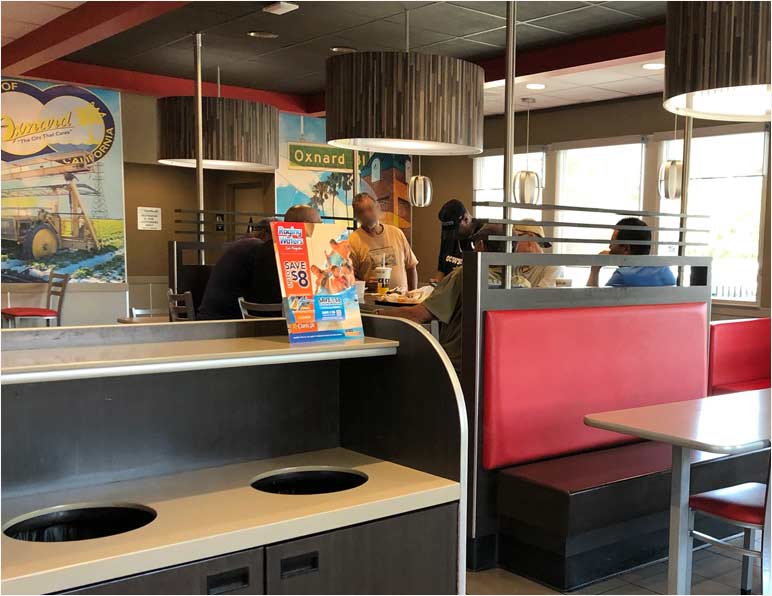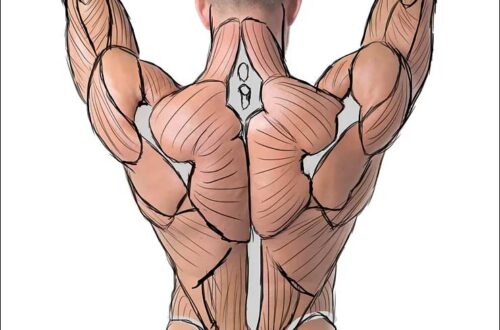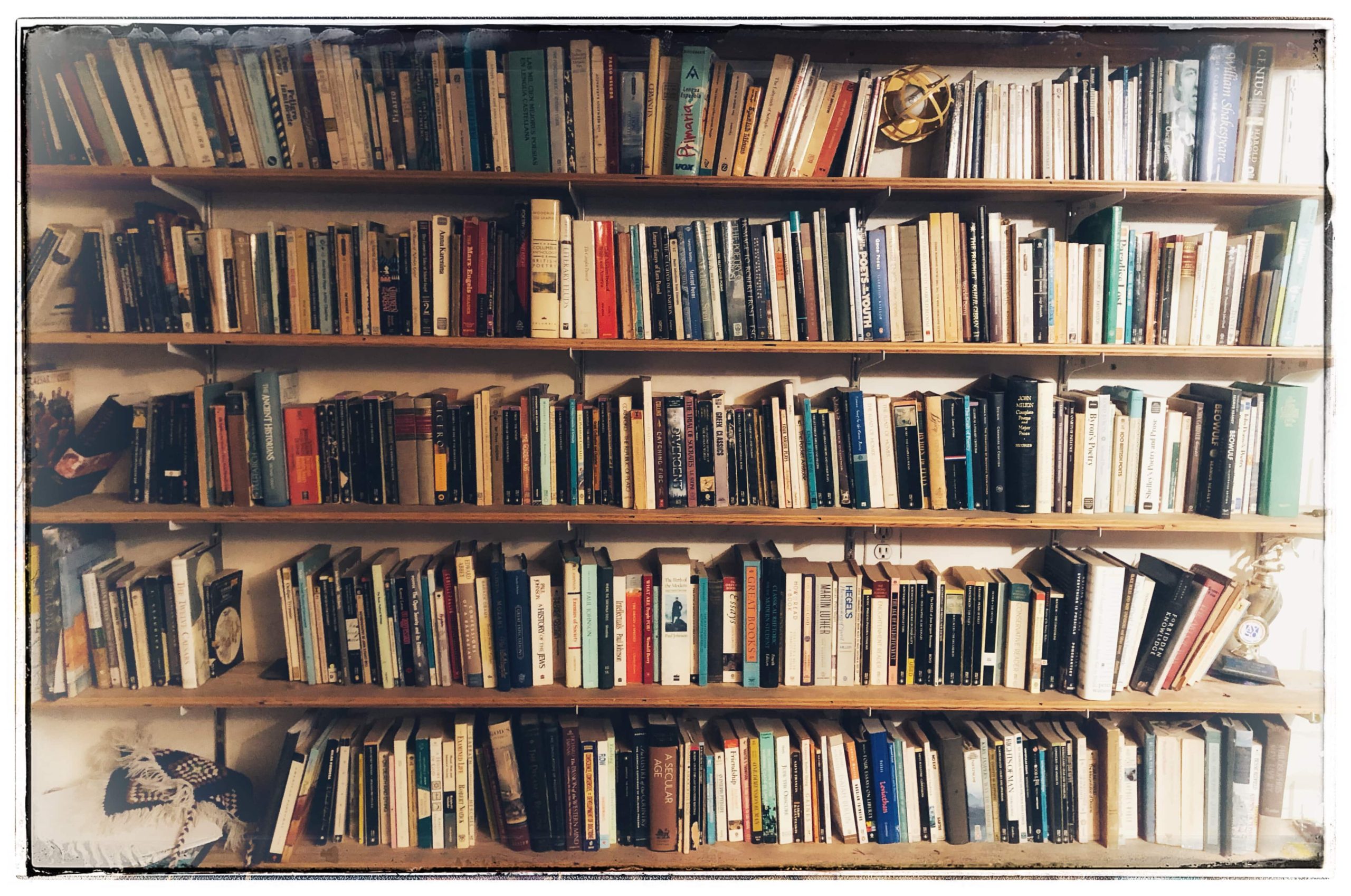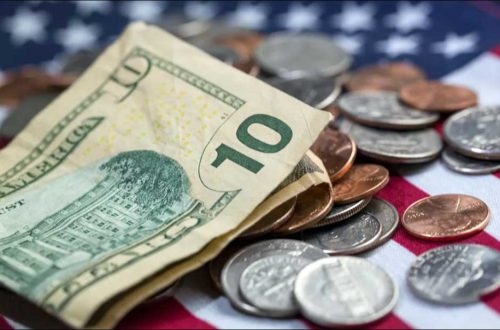I don’t much like hanging out at home.
It has been like that since I have been an adult. The world is just too interesting to stay at home for long: there are places to go, the world to view, things to learn.
And so this summer I have been in many a restaurant, coffee shop, bistro, etc. — just sitting there for hours, reading or writing, but mostly just thinking. My wife and daughters accidentjailally came across me in a Carl’s Jr. just sitting there at a booth looking out the window into space, lost in my own thoughts. She thought it was plain weird, straining to understand. But I have been doing just that for decades. There comes a time when there are just too many other people around and I need to be alone, and so I usually go somewhere and sit. Then in the quiet I can take the pulse of my interior life — get in touch with the temper of my soul. Get my sense of self back. If I flee from others when it is too much, I come back to them afterwards a happier person. I am happy to return after I have had some “alone time.”
Yes, I am an introvert.
Twice this summer I have been in the same Carl’s Jr. in Oxnard around lunchtime. Twice I encountered the same group of older men having lunch together. This collection of diners were together much longer than it took to eat their meals, and it became obvious to me they were together more for the company and conversation than for the food. This was an ad hoc men’s group meeting. A fly on the wall nearby, I scrutinized these guys. There were two African-Americans, and the others were Latino or Caucasian. Did they work together? A couple were old enough to be retired, but maybe they knew each other from some volunteer or civic organization? The Kiwanis? Rotary Club? I enjoyed eavesdropping on the easy conversation that passed between them. One or two talked more than the rest, and they conversed naturally and relaxedly about sports, family, and acquaintances. These were guys who had known each other for some time. Just a bunch of guys talking. Did it matter what about?
And they were in no hurry to finish their meals and leave. They talked and talked and talked. Again, there were there for the camaraderie. The food was secondary.
Why do I find this worthy of note?
It is because I have spent so much time lately thinking about loneliness in America and its link to “diseases of despair” like alcoholism, opioid addiction, and suicide. Largely due to these afflictions, the life expectancy of Americans has dropped in each of the last two years. And the worst demographic for these ills, I have read, has been middle aged white males. They reportedly overdose and/or kill themselves at a frightening rate.
I re-read with interest last month Sebastian Junger’s “Tribe: On Homecoming and Belonging.” That book describes a contemporary America — with its aggressive individualism and atomized lifestyle — as being at variance with how humans have lived for thousands of years. In a large-scale, impersonal society in modern America we lack the dense, connected web of human contact that hunter gatherers in enjoyed for millennia. For the vast majority of our history, homo sapiens lived in intimate tribes of fifty of so people. Junger claims that to live closely with your tribe, and to interact daily with a handful of families in your clan, is the recipe for human happiness. Native Americans lived this way, for example, until European contact changed their cultures. This “modern” manner of living among large numbers of mostly strangers is a relatively new development, evolutionary-speaking, and Junger posits that it is not good for us. We live with much looser bonds with our neighbors, and we enjoy much less emotional support in our day to day lives. Hence, we find the modern person suffering from an existential angst that is largely unknown in tribal societies, or so Junger posits. A villager in rural Africa has so much less than a contemporary European or American, but visitors have claimed they are happier than us with the little they have.
It is an almost unpardonably broad thesis that Junger makes, subject to all sorts of qualifications and “yes, buts…”
But I wonder. So many Americans nowadays live alone, compared to previous generations. Marriage among the young is on the decline, and there are increasing amounts of elderly people and they often live alone. Single parent families are almost in the majority. The institutions that used to power American social life — the church, marriage, manufacturing, local sports leagues, etc. — have declined in influence. Robert Putnam famously posited in 1995 that Americans no longer bowled in leagues. Americans bowl alone now, Putnam claimed. Civic participation had declined, according to him.
I think it is much worse now in 2019. On a typical Friday night two decades ago, a whole town might go to watch the local high school basketball team play. Not so much anymore. Now most Americans go home alone and look at screens. They text each other, post and comment about photos on Instagram or Facebook, or argue about politics on Twitter. Americans are alone together online. Or they binge watch TV shows on Netflix or cruise around Youtube. All this staring at screens is a poor substitute for face-to-face contact, in my opinion.
And then add economic insecurity and irregular work hours to the mix. And a woman-led family that has no other adult in the house — struggling single-mothers and moving constantly. And young people — and not so young people — who struggle to make human connections and find guidance in the trials of life. They encounter difficulty in finding worthwhile work to do and communities of people to love and be loved by, and understandably they feel pain. They struggle. They move to these chemicals to dull that pain, or to escape it. They are in despair. Nobody really cares about them — not really. And they know it. Expressions of supports from strangers are not enough. They might have an overwhelmed parent and a few others in their corner, but it is a lot less than when families, churches, and communities were closer knit. Those struggling need real life people in their corner.
I remember going to court to watch the sentencing of the lady who killed my friend Chris. They were running late, so I had occasion to watch a bunch of strangers be sentenced to prison beforehand. It could have not been more depressing. Prisoner after prisoner approached the bench wearing county jail jumpsuits to be sentenced to prison terms. Again and again Ventura County Superior Court Judge Ryan Wright intoned: “I hereby sentence you to x years in the California Department of Corrections.” All the sentences were seemingly for drug offences. But in watching all these jail birds be ordered off to prison for years, there was not one family member present in the audience to offer support or encouragement. These were society’s losers: drug addicted, career criminals, alone, perhaps God forsaken. Going to prison for long stretches of time without anyone to say “goodbye” to them.
Those are extreme examples, admittedly. But still there are so many Americans who have so little support in their lives. One will encounter suicide-prevention announcements, or experts claiming (correctly) that depression is a treatable mental illness. But those at risk don’t primarily need public service announcements. They need a medical doctor and probably medication, which hopefully is the message of this announcement. But beyond that they need family, friends, teammates, fellow worshipers, and neighbors. They need to pursue their paths with others intimately enmeshed in their daily lives. Parents, siblings, grandparents, cousins. Co-religionists who belong to and worship at the same church. Stable communities. Regular employment. A desire to make the concrete changes that might result in a better future, and a commitment to follow through. Advice and support from elders on how to be a good spouse and a responsible parent. Rituals for the stages of growing up; rites of passage. Role models they can see with their own eyes and seek to imitate. A meaningful job to go on Monday morning which allows them to get by. People who love them and whom they love in return. That is what keeps a person firmly anchored to the straight and the true.
Too many Americans, in my view, have too little of that. They have enormous freedom, but that is almost all they have. Too much freedom and too little support. They are choking on their individualism. They are too often isolated and alone. And this is not healthy for homo sapiens. All these complicated factors combine to produce too many Americans ready to “chase the dragon” into a heroin syringe or escape to the bottom of a bottle of alcohol, or to bite a bullet in suicide. The symptom is pain and despair. The resulting attempt to medicate away that pain leads to dangerous actions. Suicide can be the ultimate escape, whether it be slow through drugs or alcohol or sudden by jumping off a bridge. Or a person in grave personal pain indulges a murderous shooting spree in public, striking out at strangers rather than inward towards the soft self. Evil will have its day.
There are other examples, however. In Oxnard these gentleman had found a group of guys who enjoy each other’s company. For a few hours they are together and can enjoy warm conversation and mutual support. That is important. It is a prophylactic against isolation and despair, and the so many ill effects that emanate from it. (I read with interest how researchers posit that being a member of an organized sports team can protect a young person from the negative effects of “adverse childhood events.”) These gentlemen in Oxnard were not meeting in this Carl’s Jr. as members of a church or any official organization, as far as I could tell. They seem to have just gotten together to talk and pass the time. It is as if these humans sensed what they needed, and so without any external help they formed a group that gets together regularly. To be together thusly felt good. They were healthier because of it.
I read this summer in Chris Arnade’s “Dignity: Seeking Respect in Back Row America” about how people all over the United States sit in McDonald’s fast food restaurants and do much the same thing. A couple of friends can meet to get a bite to eat at McDonald’s and linger as long as they want. The food is tolerable and affordable. It is clean and safe. The bathrooms work and nobody hassles you. Almost every small town in America has at least one McDonald’s: they are everywhere. People gather at the local McDonald’s, Arnade claims, and enjoy each other’s company — similar to what I saw at the Carl’s Jr. in Oxnard.
Bravo!
I saw something similar while on vacation in Mammoth Lakes, CA at the beginning of the summer. I was in a hotel room with my family, and we went to sleep at nine o’clock at night. This is very early for me, and I woke up around four in the morning wide awake. I cannot really sleep for more than seven hours, and so I was awake in the dark with no chance of more sleep. Normally, I would grab a book and start reading until day broke and my family awoke. But I could not turn on a light in our hotel room without disturbing everyone else. So I quietly put on my clothes, grabbed my wallet and keys, and drove somewhere else. To be more exact I pulled up to a Starbucks in the dark at exactly five am when it opened up. I got a hot chocolate and sat down to read. Three middle aged men arrived a few minutes later in the predawn darkness, ordered coffees, and then proceeded to talk for a full hour. Similarly to those guys in Oxnard, the men in the Mammoth Starbucks dived fully into conversations that had been going on for weeks or longer. One guy made a point of arguing in detail a point about a European soccer team from their last conversation. These guys met up at this Starbucks at 5:15 am to get their morning dose of strong coffee and male companionship. This was probably a regular occurrence.
Good for them!
Although I marvel that they would get together at the unearthly hour of 5:15 am. In the dark!
I have found women find these activities more naturally than men. They join book clubs or go out to drink wine and laugh and complain about their husbands and/or children, or they talk on the phone for hours. This is to the credit of the female sex, and I think overall adult women do a better job at fostering friendships and finding connection than do adult men. Their suicide numbers are certainly lower, although their depression and anxiety rates are higher.
But where so many of the social trends today in terms of unhealthy technology use, unstable economic conditions, and fraying family and community institutions militate against happiness in America, there are positive examples. People can sense what they need, go out and look for it, and then make a change for the positive. They can find healthy contemporary substitutes for what used to work in the United States but no longer works so well.
Bravo, gentlemen!
Find out what you need, and then go out and get it.
Too many of us are divorced from the wisdom of our ancestors on how to live well. But if your elders cannot help you, or if your world has no wise elders in it — than go out and find that which will improve your life. It is out there.
Despair is not inevitable and inescapable.
There are guides and teachers all around.
“When the student is ready, the teacher will appear.”







One Comment
Kevin Barrett
Hi Richard,
Another excellent post! As an introvert, I find I have many of the same issues you’ve mentioned.
I believe American society used to have “some” of the things you describe, but they have been disused and forgotten – some are still there, but seem (to me) to be less promoted. We had Cub Scouts and Boy Scouts, bowling leagues and bingo nights. Distance and time constraints have taken their toll on many of these activities.
I (personally) feel a good chunk of these emotional problems (depression, suicide, addiction) are the direct result of a lack of “rite of passage” into adulthood. It used to be you graduated from high school, got a job and got married. Without the near constant pressure to get (and pay for) a more impressive house or car, folks could have time to breathe and live a bit – to smell the roses, as it were. High school doesn’t mean what it used to and a BA / BS is no guarantee of a decent (safe, well paying, with benefits) job anymore. We never have a point where we are allowed to say: “I am an adult. I have proven myself. I’ve made it.”
Of course this is not in isolation and there are always other factors, but I believe this is a systemic issue for under-regulated capitalism in modern America — and I don’t see anyone on the horizon with the vision and will to change the system. At the moment, the best we seem able to muster is the will to remove a criminal from the Oval Office (by voting, not via impeachment). I personally think this period is America’s peril in the desert. I hope a Moses turns up before too long…
Anyway, like I said, a thought provoking post.
Kevin